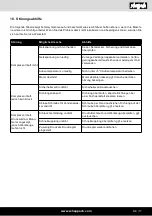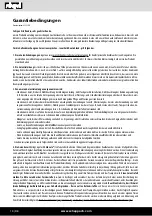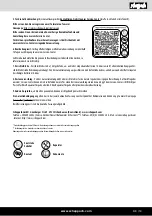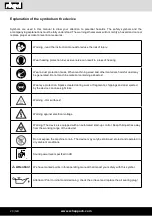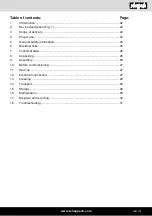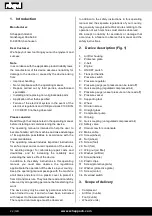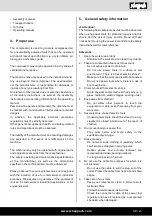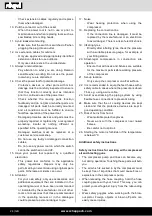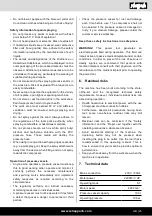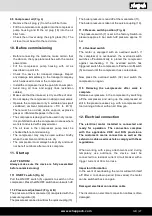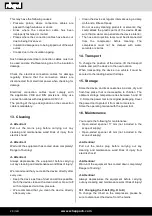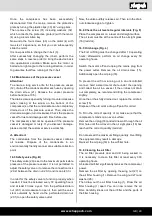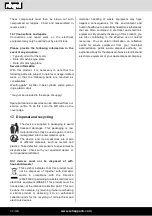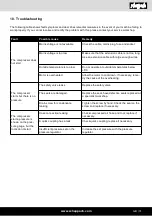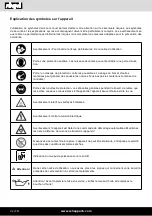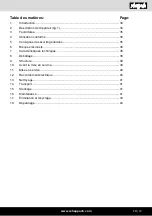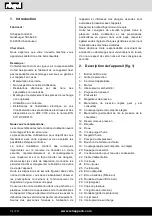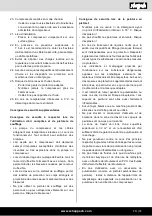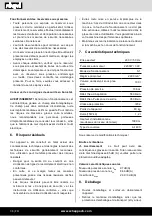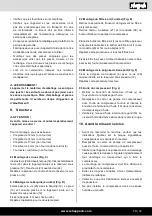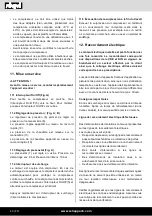
www.scheppach.com
GB | 25
• Do not blow at people with the blow-out pistol and
do not clean clothes while being worn. Risk of injury!
Safety information for paint spraying
•
Do not process any paints or solvents with a flash
point below 55° C. Risk of explosion!
• Do not heat up paints or solvents. Risk of explosion!
• If hazardous liquids are processed, wear protective
filter units (face guards).
Also, adhere to the safety
information provided by the manufacturers of such
liquids.
• The details and designations of the Ordinance on
Hazardous Substances, which are displayed on the
outer packaging of the processed material, must be
observed. Additional protective measures are to be
undertaken if necessary, particularly the wearing of
suitable clothing and masks.
• Do not smoke during the spraying process and/or in
the work area. Risk of explosion! Paint vapours are
easily combustible.
• Never set up or operate the equipment in the vicinity
of a fire place, open lights or sparking machines.
• Do not store or eat food and drink in the work area.
Paint vapours are harmful to your health.
•
The work area must exceed 30 m³ and sufficient
ventilation must be ensured during spraying and
drying.
• Do not spray against the wind. Always adhere to
the regulations of the local police authority when
spraying combustible or hazardous materials.
• Do not process media such as white spirit, butyl
alcohol and methylene chloride with the PVC
pressure hose. These media will destroy the
pressure hose.
• When using in conjunction with spraying accessories
(e.g. a paint spray gun): Keep the spray attachments
away from the device when filling and do not spray
towards the compressor.
Operation of pressure vessels
• Anyone who operates a pressure vessel must keep
this in good working order, operate and monitor it
correctly, perform the necessary maintenance
and servicing works immediately and implement
safety measures as required according to the
circumstances.
• The regulatory authority can instruct necessary
monitoring measures in individual cases.
• A pressure vessel must not be operated if it exhibits
a defect that poses a danger to personnel or third
parties.
• Check the pressure vessel for rust and damage
each time before use. The compressor shall not
be operated if the pressure vessel is damaged or
rusty. If you discover damage, please contact the
customer service workshop.
Keep these safety instructions in a safe place.
WARNING!
This power tool generates an
electromagnetic field during operation.
This field can
impair active or passive medical implants under certain
conditions. In order to prevent the risk of serious or
deadly injuries, we recommend that persons with
medical implants consult with their physician and the
manufacturer of the medical implant prior to operating
the power tool.
6. Residual risks
The machine has been built according to the state-
of-the-art and the recognised technical safety
requirements. However, individual residual risks can
arise during operation.
• Health hazard due to electrical power, with the use
of improper electrical connection cables.
• Furthermore, despite all precautions having been
met, some non-obvious residual risks may still
remain.
• Residual risks can be minimised if the “Safety
information” and the “Proper use” together with the
operating manual as a whole are observed.
• Avoid accidental starting of the machine: the
operating button may not be pressed when
inserting the plug in an outlet. Use the tool that is
recommended in this operating manual. This is
how to ensure that your machine provides optimum
performance.
• Keep your hands away from the work area, when the
machine is in operation.
7. Technical data
Mains connection
230 V / 50Hz
Motor power
2200W / 3 HP
Operating mode
S1
Motor speed
2900 min
-1
Pressure vessel capacity
100 l
Operating pressure
10 bar







